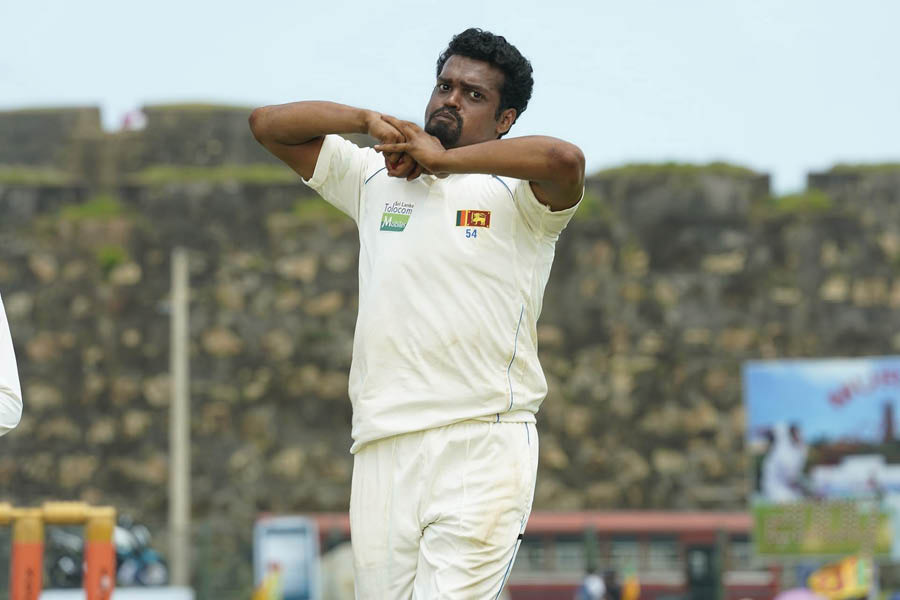Few things in cricket can match the visceral experience of watching Muthiah Muralidaran bowl. From his enigmatic eyes to his enchanting action, from the endless revolutions on his deliveries to the endearing smile that he reserved for his victims, Muralidaran produced an explosion of emotions every time he stepped on to the pitch. 800, his biopic — streaming on Prime Video and JioCinema — takes these emotions and dilutes them with a mechanical approach to storytelling that would have been the equivalent of asking Sri Lankans to replace a genius spinner with a bowling machine. Given the right instructions, a bowling machine could also have picked 800 Test wickets (just like Muralidaran) but it would have been no fun. The same can be said of 800 (originally in Tamil), which feels more like a well-researched montage than a moving film on one of the greatest cricketers of all-time.
It is not easy to tell the story of a player who has taken more wickets than anyone in the history of his sport. Add to that the fact that for much of his life, Muralidaran struggled to fit in as a Tamilian in a Sinhalese-majority Sri Lanka and you have a cocktail of drama involving the intricate relationship between communal identity and exceptional individualism. As director, M.S. Sripathy takes an academic approach to capturing this relationship, resulting in an emotional arc that never quite takes off. The idea of having two parallel timelines — one building up to Muralidaran’s 800th Test scalp, against India, in July 2010 and the other charting Muralidaran’s life from the origin story of his grandparents — seems impressive on paper. But it ends up shackling the narrative by converting inflection points in Muralidaran’s journey into bullet points in a chapter of visual history, sometimes quite literally!
The human story takes precedence
800 spends a fair amount of time contextualising the animosity between the Sinhalese and the Tamilians in Sri Lanka of the 20th century. This exposition pays off when Muralidaran — played by a steady Madhurr Mittal — shares a meal with the LTTE (a Tamil militant organisation also known as Tamil Tigers) and questions them about their violent tactics in securing a separate Tamil state. The film also does a commendable job of reflecting the political crises baked into Muralidaran’s journey through seemingly mundane everyday moments that stop short of evoking pity for the protagonist. Mittal excels in these scenes, striking the right balance between humour and heft, which makes relating to Muralidaran a breeze.
Ironically, it is whenever the focus shifts to the field that Mittal, as well as the film, flounders. For his part, Mittal has mimicked a lot of Muralidaran’s mannerisms earnestly, including replicating one of the most complicated bowling actions seen in cricket. But Mittal’s Muralidaran is rarely given a chance to emote on the pitch, with events unfolding hastily and without any serious attempt at building tension. Everything from Sri Lanka’s 1996 World Cup triumph in Lahore (a sensational underdog story in its own right) to Muralidaran’s 16 wickets at The Oval in 1998 to his rivalry with Shane Warne is treated as if it constitutes the sideshow to the real story of a nation reluctantly embracing an outlier. By the time a quarter of the movie’s 159 minutes has played out, it is clear that the human story takes precedence over the cricketing story even though the first would not have been possible without the second.
More interested in documenting greatness than attaining it
The one aspect of Muralidaran’s cricket that gets the attention it deserves in 800 is the controversy regarding his unconventional bowling action, which led to multiple accusations of chucking across his time with the national team. This subplot of whether the world’s most prolific wicket-taker should even be allowed to bowl emerges as one of 800’s highest points because it subtly mirrors the insider-outsider conflict in sport that Muralidaran is all too familiar with in life. Eventually, when Muralidaran prevails and is given the clean chit once and for all, the film has the more poignant of its two climaxes. The second, rather obvious given the title, is the moment when Muralidaran dismisses Pragyan Ojha to take his 800th wicket off the last ball of his Test career. This is the kind of moment that would take double the screen time if remade in Bollywood, but in the hands of Sripathy, it feels understated yet understandable. There is no overwhelming background score trying to force-feed excitement, no razzmatazz in the editing to portray Muralidaran as Superman. Instead, there is just about enough hype to ensure that Muralidaran’s send-off does not feel anti-climactic.
There are some lovely mini-moments in 800 — a senior going from ragging Muralidaran to being a mentor in the space of a few minutes, Muralidaran cleaning clothes in England before getting a chance to clean up the English batters, a sweet exchange between Muralidaran and his wife, Madhimalar Ramamurthy (played by Mahima Nambiar), towards the end — but they are not enough to unite the film into an engaging whole. Much like his days with the Sri Lankan side, Muralidaran lacks a strong support cast, one of the enduring strengths of better cricketing biopics such as 83 and M.S. Dhoni: The Untold Story.
Mittal as Muralidaran is solid and sincere in most of what he does but cannot quite carry the burden of an entire film with the seamlessness that a Vijay Sethupathi (who had to back out of the film after being the original choice for the lead role) may have done. Ultimately, though, what leads to the undoing of 800 is a lack of imagination and intensity. For a bowler whose vast repertoire of variations always kept batters guessing, 800 unfolds as a predictable tale that is more interested in documenting greatness than attaining it.











